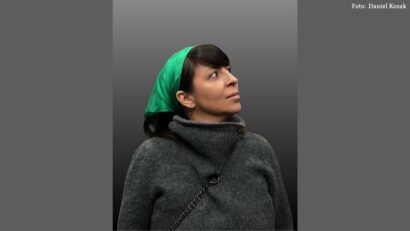The Vale of Years – Life in Rest Homes
And as long as they dont feel abandoned or useless, the elderly can miraculously turn from marginalized people into lovely grandmas and grandpas.

Ioana Stăncescu, 23.10.2013, 14:08
Teodora Dragut: “It’s a big mistake to stay away form such homes. When I told some friends where I was living, they told me “God, you’re living in an asylum?” This is no asylum, but a home offering you a peaceful life. This is exactly why old people are still on the streets, because they’re afraid and embarrassed to live in such homes”.
It’s been more than a year since Teodora Dragut chose to move into the Nicolae Cajal Rest Home of the Bucharest City Hall. She says she was lucky to have met a few kind-hearted folks who were impressed by her life story and the fact that, at the age of 85, she was living in a home for singles, with nothing but her books and a fair-headed doll she was looking after, as if it had been the child she never had.
Her only family is her sister’s son who drove her out of the house after his mother died. As her pension did not allow her to pay for her home, and as there were no other relatives to support her financially, Teodora Dragut joined the long queue of welfare cases, her fate depending entirely on the funds made available by the Bucharest City Hall. But what about all the other pensioners who find themselves in the same desperate situation? How many of them are able to find a spot in a home? How many of Romania’s old are really willing to put everything behind and share their loneliness, in an unknown place, with people in the same situation?
According to official data made public by the Social Assistance Directorate of the Labour Ministry, there are a little over 200 rest homes in Romania, both public and private, as well as a waiting list exceeding 2,600 pending requests. Of these, most refer to dramatic cases of people fighting illness and poverty.
Rest homes don’t come cheap. To get a room, the pensioner must pay the fee in full, if his or her pension allows it, or at least 60%, with the family taking charge of the remaining 40%. The state only takes care of welfare cases. But since things tend to get overcomplicated in a country like Romania, where the number of pensioners is increasing by the day, the social security budget cannot cope with the number of requests. Carmen Manu, the head of the Social Services Directorate with the Ministry of Labour, Family and Social Protection tells us more about it:
Carmen Manu: “In general, social services in former soviet states, now members of the EU, are funded from the state budget. For this reason these countries try to set up special funds, or social security programmes. These services for the elderly can be quite expensive. If we look at things in perspective we see that the population is ageing at an alarming pace and that we won’t be able to have enough funds for all of them. This is not because someone will be unwilling to provide, but because there won’t be enough for everyone in the first place. Today we witness the emergence of a new traditional type of family, where the adults must look after the children and the elderly”.
And when the adults have exhausted their possibilities, they move to rest homes. But since waiting lists are often too long and families cannot always wait for a spot in a public rest home, an increasing number of Romanians pick private homes instead. After her 90-year-old grandma had a stroke, Alexandra decided she could no longer take care of her, given that they also shared the house with Alexandra’s six-year-old daughter. As they were not very confident in the public system, they opted for a private rest home.
Alexandra: “I went to see the place and I liked it, because it looked more like a hotel rather than a rest home. My grandmother was very relieved it did not look like a hospital. Because that’s how we imagined it at first.”
Alexandra thinks it’s worth paying 450 euros a month so that her grandma may benefit from decent accommodation and assistance. In fact, Mariana Melinger, a Romanian-born Israeli who owns the center, said that she opened it with the intention to offer the elderly the comfort of a real home. However, it is not the price that makes Romanians reluctant to the idea of putting the elderly in rest homes. Here is Mrs. Melinger again:
Mariana Melinger: “We have a backward mentality. We believe that if we take our parents or grandparents to a rest home we are abandoning them. Actually, we are offering them better conditions than what they have at home.”
In spite of preconceived ideas, state-run rest homes are also trying to catch up, offer their guests more comfort and involve them in all sorts of creative activities:
Mariana Melinger: “They have a club here, they can take part in all sorts of activities, talk to each other, watch TV; we even run a glass-painting course. We have two dogs, a parrot and a fish tank…We take them on tours to monasteries and invite them to barbeques, to make them feel like they have a family. In summer we take them to a guest house in Moeciu, where they benefit from the same professional assistance.”
Calin Maxim, head of a state-owned rest home in Bucharest, is very proud of the conditions the rest home he runs offers. Nevertheless, Mrs. Olga, who has been living in such home since she lost her husband seven years ago, has a different opinion:
Calin Maxim: “I found it pretty difficult to get used to the new environment at first. I feel OK now, but I still cannot refer to this place as my home. It’s like home and family, but, somehow different, you know.”
And indeed, the elderly may perceive life in such an establishment as something very different. However, they still have hopes and dreams, as psychologist Mirela Fita with the Nicolae Cajal center tells us:
Mirela Fita: “They wish to stay in good health, and not end up bedridden. They want to be as active and healthy as they possibly can.”
And as long as they don’t feel abandoned or useless, the elderly can miraculously turn from marginalized people into lovely grandmas and grandpas.






























